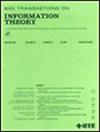Parallel Welch–Berlekamp Algorithm
IF 2.2
3区 计算机科学
Q3 COMPUTER SCIENCE, INFORMATION SYSTEMS
引用次数: 0
Abstract
This paper presents new variants of the Welch-Berlekamp algorithm that are favorable to hardware implementation. First, we derive the parallel Welch-Berlekamp (PWB) algorithm in a constructive manner based on the properties of solutions to the rational interpolation problem. The algorithm features the simultaneously performed discrepancy computation and polynomial update. Second, we explore the early-termination mechanism of the PWB algorithm for decoding of Reed-Solomon (RS) codes. By introducing the concept of incomplete error locator polynomial, we show that if并行Welch - Berlekamp算法
本文提出了有利于硬件实现的Welch-Berlekamp算法的新变体。首先,基于有理插值问题解的性质,以建设性的方式导出了并行Welch-Berlekamp (PWB)算法。该算法的特点是误差计算和多项式更新同时进行。其次,我们探讨了用于RS码解码的PWB算法的早终止机制。通过引入不完全错误定位多项式的概念,我们证明了如果$e \leq t$(其中e为错误数,t为纠错能力),则PWB算法最迟可以在$(t+ e)$ -th迭代完成时终止。这导致了提前终止PWB (EPWB)算法。最后,我们开发了频域版本的PWB和EPWB算法,即FPWB和FEPWB。这两种算法的关键是用多项式求值的更新来代替多项式系数的更新。值得注意的是,FEPWB算法只适用于缩短的RS码。在此基础上,设计了一种有效的FPWB算法的收缩结构,使之易于适用于FPWB算法。
本文章由计算机程序翻译,如有差异,请以英文原文为准。
求助全文
约1分钟内获得全文
求助全文
来源期刊

IEEE Transactions on Information Theory
工程技术-工程:电子与电气
CiteScore
5.70
自引率
20.00%
发文量
514
审稿时长
12 months
期刊介绍:
The IEEE Transactions on Information Theory is a journal that publishes theoretical and experimental papers concerned with the transmission, processing, and utilization of information. The boundaries of acceptable subject matter are intentionally not sharply delimited. Rather, it is hoped that as the focus of research activity changes, a flexible policy will permit this Transactions to follow suit. Current appropriate topics are best reflected by recent Tables of Contents; they are summarized in the titles of editorial areas that appear on the inside front cover.
 求助内容:
求助内容: 应助结果提醒方式:
应助结果提醒方式:


